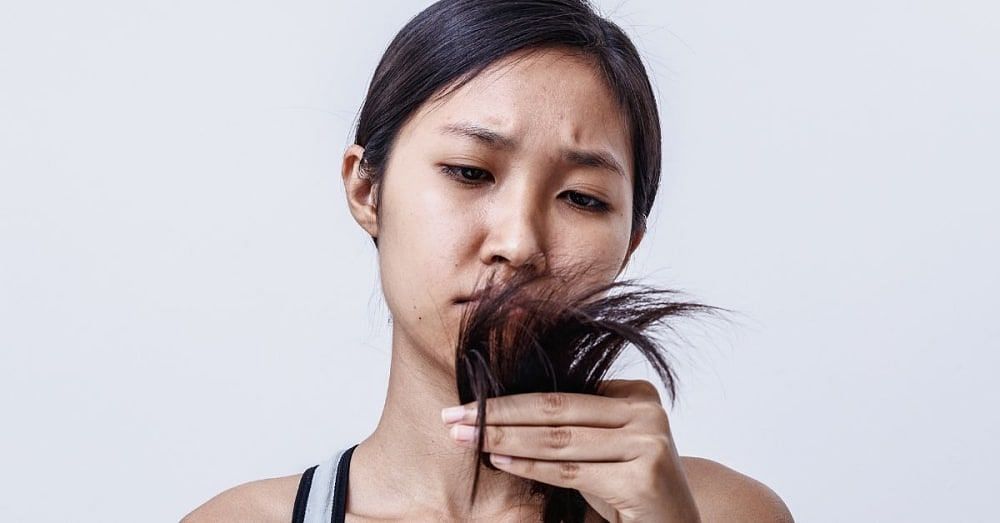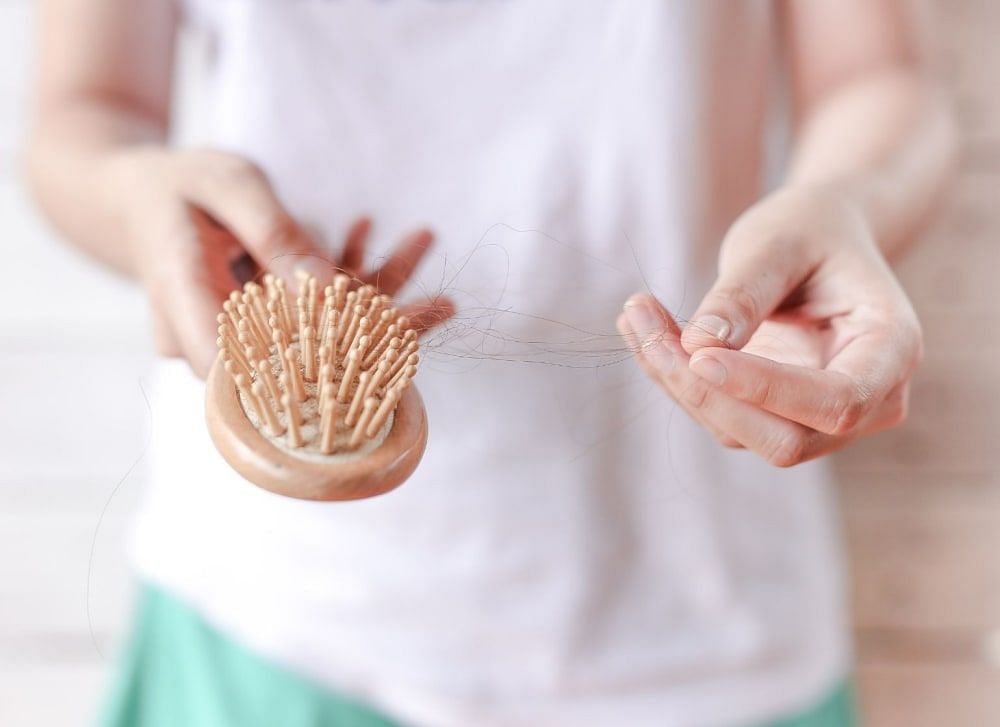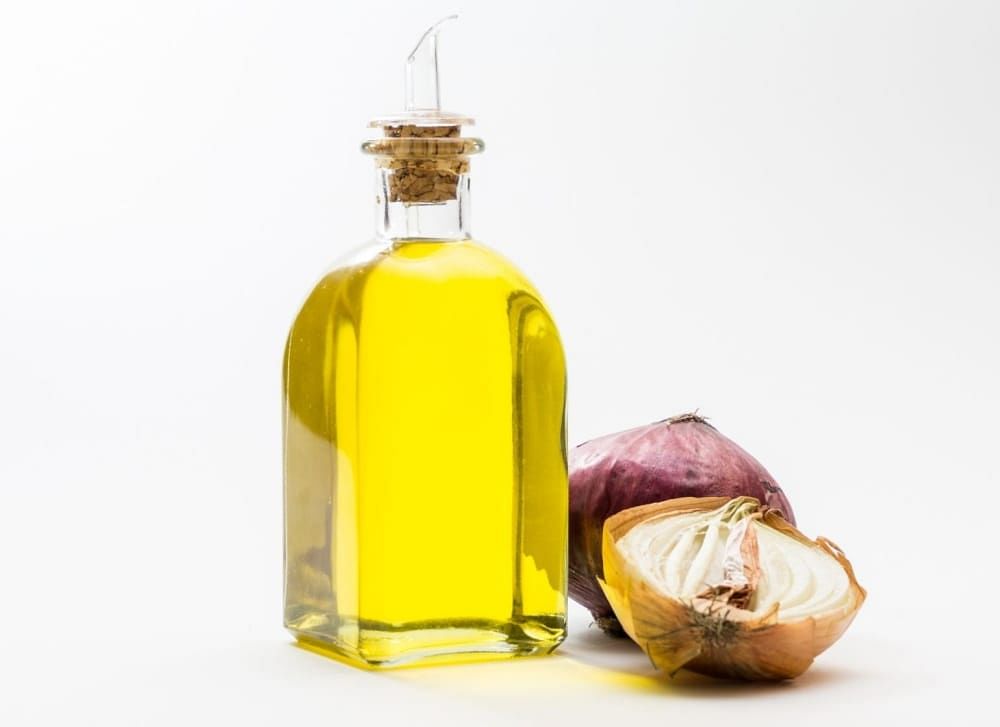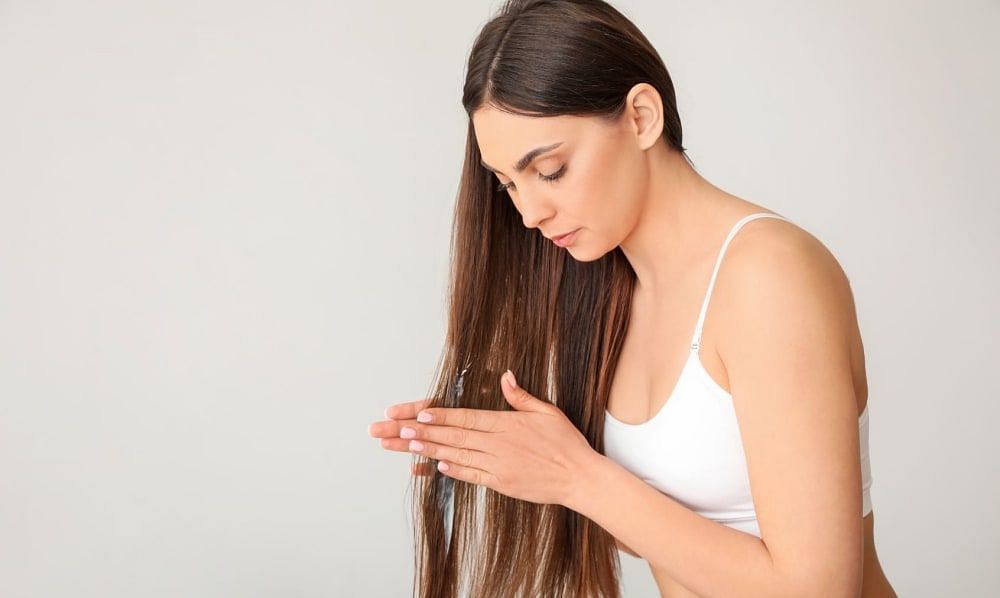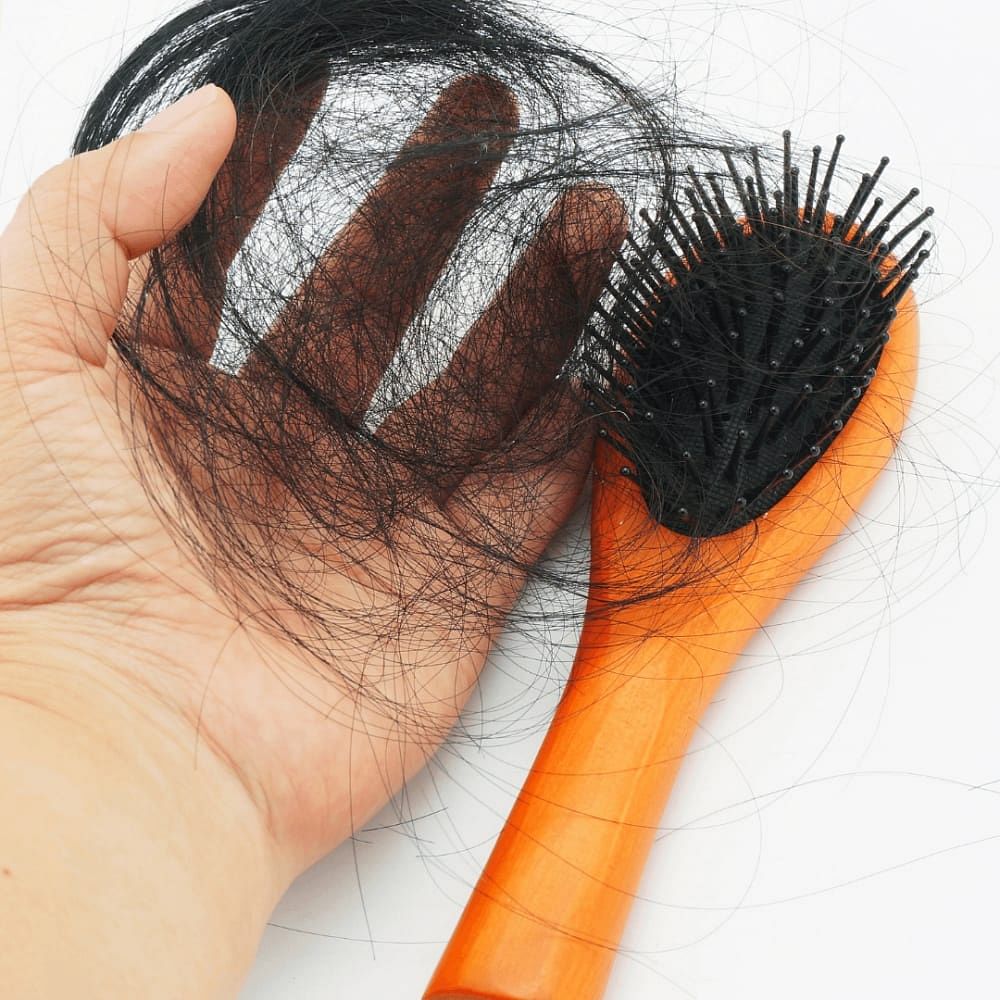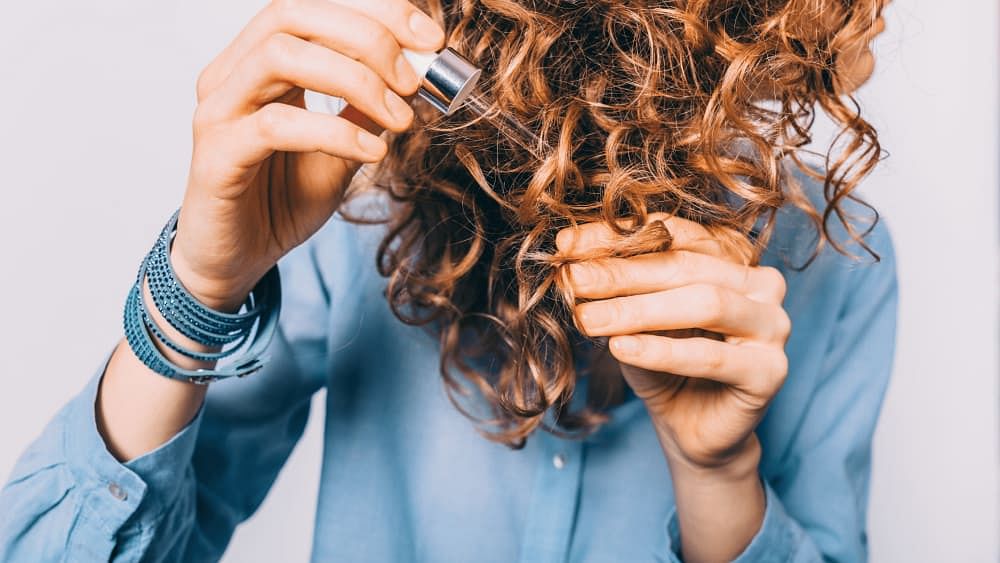Introduction
Are you worried about constant hair loss? Did you know that vitamin deficiency causes hair loss? Hair loss is a common disorder that affects over 90% of both males and females. The connection between vitamin deficiency and hair loss will be discussed in this article.

What is a vitamin deficiency?
One of the six primary vital nutrients required for human life is vitamins. These other vital nutrients include proteins, carbohydrates, lipids, water, and minerals. A long-term deficit of any vitamin is known as vitamin deficiency. A primary deficiency results from inadequate vitamin consumption, whereas a secondary deficiency results from an underlying disease like malabsorption.
Which vitamin deficiency causes hair loss
A vitamin insufficiency may be the culprit for your thinning hair. Want to know the deficiency of which vitamin causes hair fall? Here are 15 vitamin deficiencies that could cause thinning hair:
1) Vitamin D
According to science, vitamin D plays a key role in stimulating the growth of your hair follicles. Vitamin D is present in keratinocytes, the skin cells that break down the keratin, a protein essential for hair. Thus low vitamin D levels disrupt the growth cycle in hair follicles.
2) Vitamin A
Regarding hair loss, vitamin A has distinct characteristics. Both the immune system's ability to protect hair follicles and the processes of hair cell growth and proliferation depend on it.

3) Vitamin C
Unexpectedly, vitamin C is another common hair fall deficiency. The essential role of vitamin C in absorbing iron in the intestines is what makes the difference.
4) Vitamin E
Vitamin E is a vital fat-soluble antioxidant. According to the researchers, vitamin E's antioxidant qualities help against oxidative stress and free radical damage common in most types of hair loss.
5) Vitamin B2
Vitamin B2 (riboflavin) is another common hair fall deficiency. This is because numerous functions, such as cell growth, fat metabolism, and energy production, require this vitamin.
6) Vitamin B5
Red blood cells, which deliver oxygen and nutrients to the hair follicles, are primarily produced by vitamin B5, which is essential for this process. A lack of vitamin B5 can cause premature greying, thinning hair, and dry, itchy skin on the scalp.

7) Pyridoxine(vitamin B6)
The levels of androgens and other hormones that control hair growth can be maintained using vitamin B6. Thus vitamin B6 is another common hair fall deficiency.
8) Vitamin B7
Another common cause of hair loss is a deficiency of vitamin B7, popularly known as biotin. A lack of biotin can cause brittle hair loss and a dry, itchy scalp.
9) Vitamin B9
Vitamin B9 is commonly known as folic acid (in synthetic form) and folate (natural form). As per research, folate deficiency is seen in people with female pattern baldness and telogen effluvium. Thus another hair loss female vitamin deficiency is vitamin B 9.
10) Vitamin B12
B12 deficiency hair loss is common nowadays. After all, this micronutrient is necessary for synthesizing red blood cells and DNA, which are essential for growing new hairs. Thus, when vitamin B12 levels are low, hair follicles fail to grow new hairs.
11) Iron
Hemoglobin is made from iron, a protein that helps transfer oxygen to every cell in your body, including your hair follicles. As per the study, iron-dependent genes in the hair follicle bulge region are affected by iron deficiency.
12) Zinc
Zinc maintains the optimal function of the oil glands that surround the hair follicles. Thus, zinc deficiency is one of the top causes of telogen effluvium, or brittle hair.
13) Selenium
Selenium has exceptional antioxidant properties that regulate your metabolic activities. However, selenium is also needed to produce thyroid hormones, which regulate hair growth. Thus, a selenium deficiency can lead to hair loss.
14) Fatty acids
Omega-3 and Omega-6 fatty acids are essential to promote hair growth and lower inflammation. Your eyebrows and scalp hair start to fall due to fatty acid deficiency.
15) Magnesium
Magnesium is essential for more than 700 functions of your body, including the production of hair follicles and hair growth. Premature greying and hair loss can all be brought on by a lack of magnesium.

Also Read: Everything That You Need to Know About Vitamin B12 for Hair
Does vitamin A deficiency cause hair loss?
Another cause of hair fall is a deficiency of vitamin A. Lacking vitamin A can lead to hair loss. This is because the growth and maintenance of your hair, skin, and nails depend heavily on vitamin A. In addition, vitamin A protects your hair follicles and helps in their cellular growth and cell division.
The scalp's natural oil, sebum, can clog hair follicles due to vitamin A deficiency, causing hair breakage and thinning. In addition, severe vitamin A deficiency can result in telogen effluvium, which causes excessive hair loss.
Hair loss vitamin D deficiency
Hair loss vitamin D deficiency can result, as this nutrient stimulates the growth of hair follicles. The growth of new follicles helps maintain your hair thickness and prevent premature hair loss.
Also, alopecia areata, an autoimmune disorder resulting in patchy hair loss, is associated with a vitamin D deficiency. As per a study, those who have alopecia areata have much lower vitamin D levels than those who do not.
Hair loss vitamin D deficiency is seen in persons who do not have alopecia. In addition, female vitamin deficiency can also decrease vitamin D levels in other types of hair loss
Iron deficiency and hair loss
Hemoglobin transports oxygen to cells, including hair cells that promote hair growth. Thus iron deficiency is linked with hair loss and female vitamin deficiency. Without sufficient iron, your body cannot produce enough haemoglobin, which can cause hair loss and stunted hair growth.
Traditional male and female pattern hair loss can be due to iron deficiency, and it may also cause hair to fall out in a way that resembles genetic baldness.
The good news is that most hair loss caused by iron deficiency may be cured by treating the underlying cause. Research showed taking iron supplements can help with hair regrowth.

Zinc deficiency and hair loss
Zinc is an essential nutrient that your body needs for several metabolic processes, including hair growth. Thus hair loss can result from a zinc deficit.
Lack of zinc weakens the structural integrity of hair follicles by altering the protein structure of these follicles. This means new hairs will shed more quickly than they should.
The production of DNA and RNA, which is vital for the effective division of follicle cells and hair growth, depends on zinc. In addition, topical zinc use has been demonstrated to stop hair loss brought on by harmful enzymatic reactions

Selenium deficiency
Yes, selenium deficiency can indeed result in hair loss. Selenium is a vital trace mineral that is needed for healthy hair growth. The unique antioxidant capabilities of selenium boost your body's metabolic activity. It also helps maintain the hormonal balance required for minimal hair loss and healthy growth. Additionally, selenium is necessary for synthesising thyroid hormones that control hair growth.
Thus, this selenium deficiency can cause oxidative stress, hormonal disturbance, and weak immune systems, all contributing to hair loss.
B12 deficiency hair loss
Not sure about hair fall; which vitamin deficiency causes it? Check your B12 levels. Cobalamin, also known as vitamin B12, is one of those essential elements needed for hair growth. Vitamin B12 helps in oxygen-rich red blood cell production, which nourishes hair follicles and encourages healthy hair growth.
Your hair is made of keratin, a protein. Although this substance is dead, the hair follicles below your skin are very much alive. In fact, the base of your hair follicle contains the fastest-growing cells, which divide every 23 to 72 hours. In the base, the papilla has blood vessels that transport the nutrients and oxygen required for hair development. B12 deficiency hair loss is due to a lack of this nutrient affecting the production of red blood cells necessary for new hair growth.
Also Read: 10 Ayurvedic Herbs for Hair Growth
Preventing vitamin deficiencies and hair loss
Here are some tips that will help you prevent hair fall deficiency in the first place.
Maintain a healthy and balanced diet: Hair loss can be triggered by crash diets, sudden or excessive weight loss, and diets that eliminate protein.
Talk to your doctor: Work with your physician to address vitamin and mineral deficiencies.
Plan regular checkups: To ensure medical issues aren't causing vitamin and mineral deficiencies that could harm your health or hair, get tests done annually.
Healthy fatty acids and antioxidants: Consume foods high in healthy fatty acids and antioxidants that benefit hair growth.
Also Read: Exercise for Hair Growth: 15 Best Workouts for Healthy Hair

Hair loss treatment for women
Genetics, altering hormone levels, and the natural ageing process are just a few causes of female hair loss. Here are some options for hair loss treatment for women.
Minoxidil
Topical minoxidil is an over-the-counter (OTC) medication sold under the brand name Rogaine. Minoxidil is a safe hair loss treatment for women and men. Minoxidil stimulates hair growth that may lengthen the hair cycle.
Ketoconazole
As per the study, topical ketoconazole may help reduce inflammation and enhance the health and appearance of the hair.
Hair shampoos
Medicated shampoos designed to remove dead skin cells from the pores may aid in promoting healthy hair. This helps eliminate early hair loss.
Balanced diet
A healthy diet may also encourage regular hair growth. A healthy diet often includes numerous foods, including seasonal fruits and vegetables.
Light therapy
As per a study, adding low light therapy to regular 5% minoxidil treatment can enhance hair growth in people with androgenetic alopecia.
Platelet-rich plasma
Injections of platelet-rich plasma also help stop hair loss. In addition, platelet-rich plasma helps with quicker tissue healing. As per research, this therapy lowers hair loss and improves hair density.
Hormonal replacement therapy
Doctors may advise hormone therapy as a hair loss treatment for women with hormone imbalances that lead to hair loss. Birth control pills and oestrogen or progesterone replacement therapy are two common treatments.
Also Read: 7 Proven Ways to Regrow Hair Naturally in 3 Weeks with Facts & Myths
FAQs
1) What vitamin stops hair from falling out?
Vitamin B is one of the most well-known vitamins to stop hair loss and boost hair growth. Red blood cells that bring oxygen and nutrients to the scalp and hair follicles need vitamin B. Vitamin B is a well-known anti-hair fall agent and is present in several hair supplements, widely used to treat hair loss.
2) Can B12 deficiency cause hair loss?
Yes. Red blood cells that carry oxygen to your hair follicles need vitamin B12. Thus if your vitamin B12 levels are low, your hair follicles might fail to generate new hair, leading to hair loss.
3) Can low vitamin D And B12 cause hair loss?
Yes. Vitamin D is essential for the growth of your hair follicles. Keratinocytes, the skin cells that form keratin, a protein necessary for hair, contain vitamin D. Thus, the growth cycle of hair follicles is interrupted by low vitamin D levels.
The production of oxygen-rich red blood cells, which stimulate hair follicles and promote healthy hair development, is aided by vitamin B12. Thus vitamin B 12 deficiency can lead to hair loss.
4) Will hair grow back after vitamin B12?
Yes! As soon as you address the deficiency, your hair will grow again. When your body's vitamin B12 levels are restored, your hair cells will regrow and help your hair follicles generate healthy hair.
5) What vitamins make hair thicker?
Biotin, known as vitamin B7, is one of the finest vitamins for thicker hair. This is because your body uses the food you eat to produce energy with the help of biotin. Additionally, keratin, the protein your hair is made of, needs vitamin B7 for its production
6) How can I increase my B12?
You can increase your vitamin B12 by consuming the following food in your diet.
- Meat
- Fish
- Cereals
- Eggs
- Milk
- Cheese

